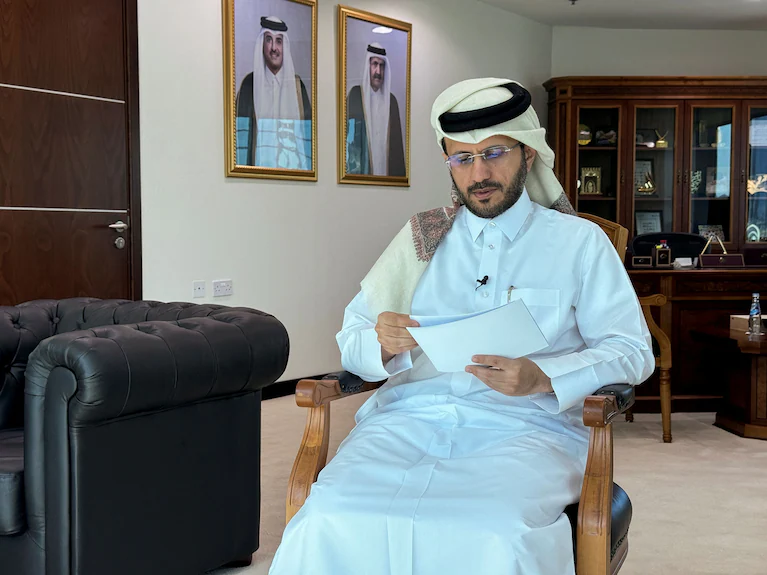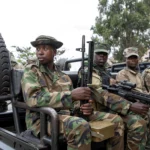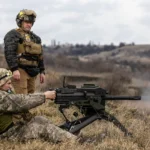President Donald Trump’s inauguration Monday spelled further uncertainty over the U.S. approach to the Middle East, as he moved to repeal President Joe Biden’s executive order imposing sanctions on Israeli settlers and entities in the West Bank that had been deemed “a serious threat.”
Responding to a reporter’s question, Trump said he was “not confident” that the Israel-Hamas ceasefire agreement would hold through all three intended phases. “That’s not our war; it’s their war,” he said.
Here’s what else to know
- The Senate confirmed Sen. Marco Rubio (R-Florida), a staunch supporter of Israel in its war in the Gaza Strip, as the new U.S. secretary of state on Monday in a 99-0 vote.
- The Palestinian Islamic Jihad militant group said in a video statement Tuesday that it would release “several enemy prisoners” it was holding in Gaza in the coming days as part of the ceasefire deal. The next round of hostage and prisoner exchanges is scheduled to take place Saturday.
- Fifty-seven people are believed to remain as hostages in Gaza, but Israel has not given the full basis for its estimates. Around 250 people were kidnapped on Oct. 7, 2023, of which about 120 have been freed so far and 74 have been confirmed killed.
- Wafa, the official news agency of the Palestinian Authority, reported that two people were killed by Israeli snipers in Rafah, in the southern Gaza Strip, on Monday evening — more than 24 hours after the ceasefire took effect. The Washington Post has not been able to verify these claims. The Israel Defense Forces did not immediately respond to a request for comment.
Qatar confident Gaza ceasefire will last, but says next stage of talks is complex

Three days into the Gaza ceasefire, Qatar says it believes the deal will hold after observing the “complete implementation” of the agreement by Hamas and Israel, according to the spokesman for Qatar’s foreign ministry.
“We are confident in the deal,” Majed al-Ansari, the foreign ministry spokesman, told reporters at his weekly briefing in Doha on Tuesday. “As of now, what we are monitoring on the ground is the complete implementation of what was agreed on and to some extent, the timely implementation of what was agreed on.”
The ceasefire that went into effect Sunday has largely ended hostilities in Gaza, allowing tens of thousands of people to return to what’s left of their homes. The deal also secured the release of three hostages held by Hamas and 90 Palestinian prisoners held by Israel. Each week, additional hostages and prisoners are set to be released.
Majid said Qatar recognizes that the next phase of negotiations are set to be much more complex than the talks that green-lit the deal’s initial phase. He said preparations for the next phase of talks are underway, but also called on the international community to keep up pressure on all sides to abide by their commitments.
“All of us have to work collectively, and I can’t stress this enough. The international community can’t take this deal for granted,” he said.
When asked about comments from President Donald Trump on Monday that he is “not confident” that the ceasefire will hold, Majid praised the U.S. president for his support of the larger diplomatic effort.
“It is their help and their support and their push that brought this across the line,” he said of the Trump administration. Majid said he would not specifically comment on Trump’s recent remarks, but he said he knows Qatar has the support of the newly inaugurated president.
“They believe in this deal, and they want peace in Gaza,” he said of the Trump administration. “They want an end to hostilities over there, and this deal is the way to do that.”
Settler attacks rage across West Bank after ceasefire starts, Trump lifts sanctions
RAMALLAH, West Bank — Israeli settlers rampaged through several villages in the Israeli-occupied West Bank overnight Monday, torching homes and businesses and vandalizing vehicles, Palestinian and Israeli authorities and human rights groups said.
The Palestinian Authority prime minister’s office said 21 people were injured in two villages. The Israel Defense Forces said dozens of Israeli civilians, some masked, instigated riots in the village of Funduq and that settlers had also attacked Israeli security forces.
“*Two consecutive nights* of pogroms and settler violence in villages and towns across the West Bank, with a clear intent to sabotage the hostage deal and the #ceasefire agreement,” the Israeli human rights group Yesh Din wrote in a message on X, referring to the ceasefire accord in the Gaza Strip between Israel and Hamas that began Sunday.
Yesh Din’s post included footage showing what appeared to be masked men setting alight a car and a home, in an area that the group said was Funduq. The group noted that President Donald Trump, shortly after assuming office Monday, had rescinded Biden-era sanctions against extremist Israeli settler groups and individuals accused of violence against Palestinians.
The U.N. human rights office warned in a statement Monday of “a wave of renewed violence perpetrated by settlers and Israeli security forces” in the West Bank. Attacks began Sunday in several West Bank villages, the statement said, after Israeli officials warned Palestinians not to celebrate prisoner releases that are part of the Gaza ceasefire deal, and settlers called for attacks on places where Palestinian “detainees are returning.”
The United Nations also expressed concern about “increased restrictions on Palestinians’ freedom of movement across the West Bank, including complete closure of some checkpoints and installation of new gates, effectively confining entire communities.”
Moving around the Israeli-occupied West Bank has become increasingly difficult for Palestinians, and in some cases impossible, since the ceasefire in Gaza took effect: All major roads and exits leading to Palestinian areas appear to now be closed or blocked by checkpoints, leading to often hours-long waits.
The Israeli military did not immediately respond to a request for comment on the scale of West Bank road closures.
Israeli raid on Jenin kills 8, injures 35

The Israeli military launched a large raid in the city of Jenin in the occupied West Bank on Tuesday, killing eight people and injuring about three dozen, according to Palestinian health officials.
The counterterrorism operation, dubbed “Iron Wall,” involves the Israel Defense Forces; Shin Bet, Israel’s domestic intelligence service; and the border patrol, the first two said in a statement.
The Ramallah-based Palestinian Health Ministry said that as of 4 p.m. local time, eight people had been killed and more than 35 people injured by Israeli forces.
Palestinian authorities have struggled to control Jenin, a hotbed of militancy. Last year, the city became a focus of Israeli military operations that often involved a combination of airstrikes and ground troops and left large-scale destruction in their wake. Last year was the deadliest for Palestinians in the West Bank since the U.N. humanitarian agency began collecting statistics in 2005, with Israeli forces killing 487 people.
The Israeli military had stopped targeting Jenin after the Palestinian Authority launched its own operation there in early December, with the goal of arresting wanted militants. The authority’s operation has stretched for more than 45 days, taking a severe toll on civilians in the Jenin refugee camp while failing to apprehend many fighters or meaningfully quell militancy there. Nine Jenin residents and six Palestinian security officers have been killed in the clashes.
Last week, Israel resumed airstrikes on the camp on two consecutive evenings, killing 12 Palestinians — including several Hamas fighters and a 15-year-old boy.









Hello. excellent job. I did not anticipate this. This is a impressive story. Thanks!
It?¦s really a great and helpful piece of info. I am happy that you simply shared this useful info with us. Please keep us informed like this. Thanks for sharing.
I truly appreciate your piece of work, Great post.